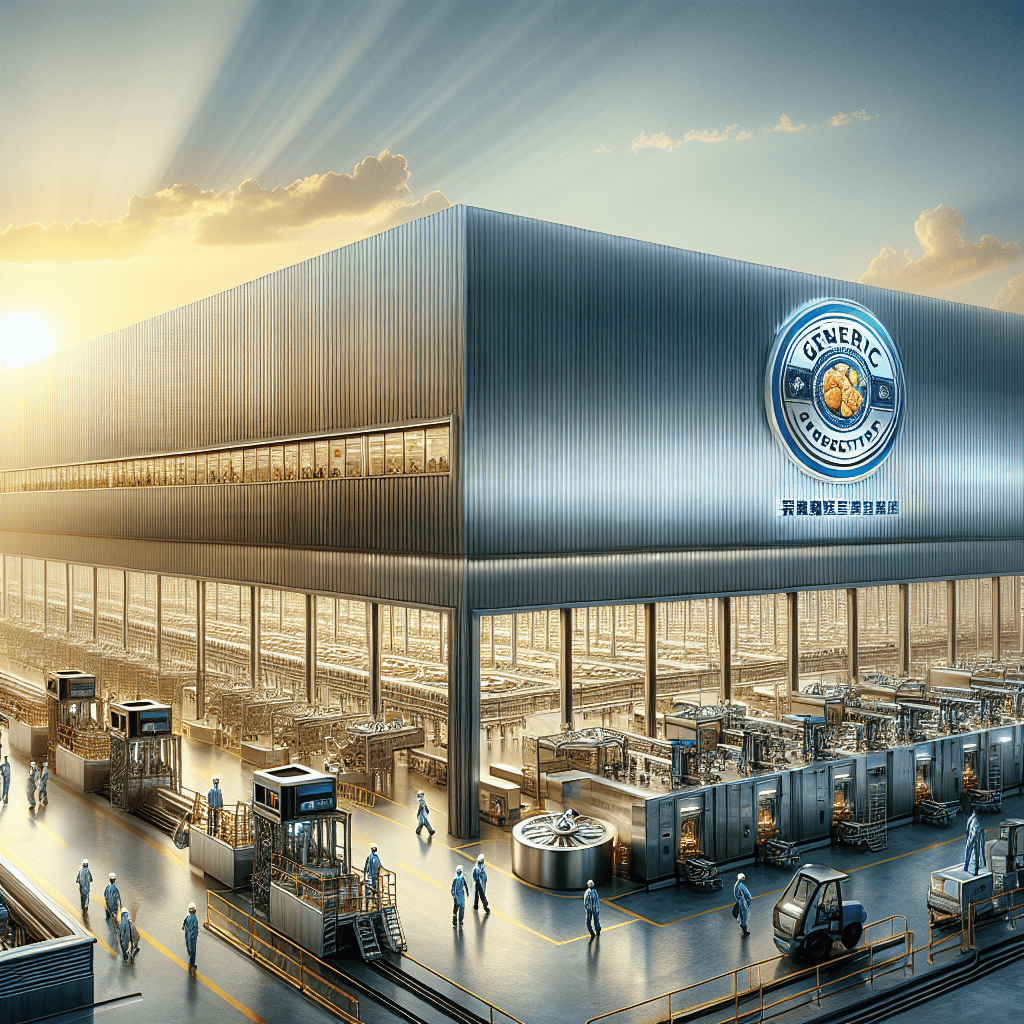“Nestlé Boosts American Flavor: $150 Million Investment in Frozen-Food Innovation”
Introduction
Nestlé, a global leader in the food and beverage industry, has announced a significant investment of $150 million to enhance its frozen-food manufacturing capabilities in the United States. This strategic move underscores Nestlé’s commitment to expanding its footprint in the North American market and meeting the growing consumer demand for convenient, high-quality frozen food options. The investment will be directed towards upgrading and expanding the company’s existing facility, incorporating state-of-the-art technology and sustainable practices to boost production efficiency and capacity. This initiative not only aims to strengthen Nestlé’s position in the competitive frozen-food sector but also reflects its dedication to innovation and sustainability in its operations.
Expansion Of Nestlé’s Frozen-Food Production In The US
Nestlé, a global leader in the food and beverage industry, has announced a significant investment of $150 million to expand its frozen-food production capabilities in the United States. This strategic move underscores the company’s commitment to meeting the growing consumer demand for convenient and high-quality frozen meals. The investment will be directed towards enhancing the capacity and efficiency of its existing facility in Jonesboro, Arkansas, a site that has been pivotal in Nestlé’s operations within the US market.
The decision to invest in the Jonesboro facility is driven by several factors, including the increasing popularity of frozen foods among American consumers. In recent years, there has been a noticeable shift in consumer preferences towards ready-to-eat meals that offer both convenience and nutritional value. This trend has been further accelerated by the ongoing changes in lifestyle, where busy schedules and the need for quick meal solutions have become commonplace. Nestlé’s expansion is thus a timely response to these evolving market dynamics, ensuring that the company remains at the forefront of the frozen-food sector.
Moreover, the investment is expected to bring about significant enhancements in the production processes at the Jonesboro facility. By incorporating state-of-the-art technology and advanced manufacturing techniques, Nestlé aims to boost the efficiency and sustainability of its operations. This will not only increase the facility’s output but also reduce its environmental footprint, aligning with Nestlé’s broader commitment to sustainability and responsible production practices. The company has consistently emphasized its dedication to reducing greenhouse gas emissions and minimizing waste, and this expansion project is a testament to those values.
In addition to technological upgrades, the expansion will also have a positive impact on the local economy. The project is anticipated to create numerous job opportunities in the Jonesboro area, ranging from skilled manufacturing positions to roles in logistics and supply chain management. This influx of employment opportunities will contribute to the economic vitality of the region, providing a boost to local businesses and communities. Nestlé’s investment is thus not only a strategic business decision but also a commitment to supporting the economic development of the areas in which it operates.
Furthermore, the expansion of the Jonesboro facility is part of a broader strategy by Nestlé to strengthen its presence in the US market. The company has been actively investing in its production capabilities across the country, recognizing the US as a key market for its growth ambitions. By enhancing its infrastructure and expanding its product offerings, Nestlé is well-positioned to capture a larger share of the frozen-food market, which continues to show robust growth potential.
In conclusion, Nestlé’s $150 million investment in its US frozen-food facility represents a significant step forward in the company’s efforts to meet consumer demand and drive sustainable growth. By expanding its production capabilities, embracing advanced technologies, and creating job opportunities, Nestlé is reinforcing its commitment to delivering high-quality products while supporting local communities. As the frozen-food market continues to evolve, Nestlé’s strategic investments will undoubtedly play a crucial role in shaping the future of the industry, ensuring that the company remains a leader in providing convenient and nutritious meal solutions to consumers across the United States.
Economic Impact Of Nestlé’s $150 Million Investment
Nestlé’s recent announcement of a $150 million investment in its U.S. frozen-food facility marks a significant development in the food manufacturing sector, with far-reaching economic implications. This substantial financial commitment underscores the company’s strategic focus on expanding its footprint in the North American market, particularly in the frozen-food segment, which has seen a resurgence in consumer demand. As the global food industry continues to evolve, Nestlé’s investment is poised to not only enhance its production capabilities but also stimulate economic growth in the region.
The decision to inject such a considerable sum into the U.S. facility is indicative of Nestlé’s confidence in the potential of the frozen-food market. Over the past few years, there has been a noticeable shift in consumer preferences, with more individuals seeking convenient, yet nutritious meal options. This trend has been further accelerated by the pandemic, which saw a rise in at-home dining and a corresponding increase in the demand for frozen foods. By expanding its production capacity, Nestlé aims to meet this growing demand while also innovating its product offerings to cater to evolving consumer tastes.
Moreover, the investment is expected to have a positive ripple effect on the local economy. The expansion of the facility will likely create numerous job opportunities, both during the construction phase and in the long-term operation of the plant. This influx of employment opportunities is particularly significant in the current economic climate, where job creation remains a critical concern. Additionally, the increased production capacity will necessitate a greater demand for raw materials and services, thereby benefiting local suppliers and businesses. This, in turn, can lead to a more robust economic ecosystem, fostering further growth and development in the region.
Furthermore, Nestlé’s investment aligns with broader industry trends towards sustainability and efficiency. The company has been vocal about its commitment to reducing its environmental footprint, and this expansion provides an opportunity to incorporate state-of-the-art technologies and sustainable practices. By investing in energy-efficient machinery and processes, Nestlé can reduce waste and emissions, aligning with its global sustainability goals. This not only enhances the company’s reputation as a responsible corporate entity but also sets a benchmark for other players in the industry to follow.
In addition to the immediate economic benefits, Nestlé’s investment is likely to spur innovation within the frozen-food sector. With increased resources at its disposal, the company can focus on research and development to create new and improved products. This could lead to the introduction of healthier, more diverse options that cater to a wide range of dietary needs and preferences. As a result, consumers stand to benefit from a broader selection of high-quality frozen foods, further driving demand and market growth.
In conclusion, Nestlé’s $150 million investment in its U.S. frozen-food facility represents a strategic move with significant economic implications. By expanding its production capabilities, the company is well-positioned to capitalize on the growing demand for frozen foods while simultaneously contributing to local economic development. The investment not only promises job creation and increased business for local suppliers but also underscores Nestlé’s commitment to sustainability and innovation. As the food industry continues to adapt to changing consumer preferences, such investments are crucial in shaping the future landscape of food manufacturing.
Sustainability Initiatives In Nestlé’s New Facility
Nestlé’s recent announcement of a $150 million investment in its U.S. frozen-food facility marks a significant step forward in the company’s commitment to sustainability. This substantial financial commitment is not merely an expansion of production capabilities but a strategic move to integrate sustainable practices into its operations. As the global demand for environmentally responsible business practices continues to rise, Nestlé’s initiative reflects its dedication to reducing its environmental footprint while meeting consumer expectations.
The investment will be directed towards upgrading the facility with state-of-the-art technology designed to enhance energy efficiency and reduce waste. By incorporating advanced machinery and processes, Nestlé aims to minimize energy consumption, thereby lowering greenhouse gas emissions. This aligns with the company’s broader sustainability goals, which include achieving net-zero emissions by 2050. The implementation of energy-efficient systems is expected to significantly decrease the facility’s reliance on non-renewable energy sources, thus contributing to a more sustainable production cycle.
In addition to energy efficiency, Nestlé is focusing on waste reduction as a core component of its sustainability strategy. The facility will adopt innovative waste management practices, including the recycling and repurposing of by-products generated during the production process. This approach not only reduces the amount of waste sent to landfills but also supports a circular economy by transforming waste into valuable resources. By doing so, Nestlé is setting a precedent for other companies in the industry to follow, demonstrating that economic growth and environmental responsibility can coexist.
Moreover, the investment will facilitate the use of sustainable packaging solutions, which is a critical aspect of Nestlé’s sustainability initiatives. The company plans to transition to packaging materials that are recyclable or made from renewable resources, thereby reducing the environmental impact of its products. This move is in response to growing consumer demand for eco-friendly packaging and reflects Nestlé’s commitment to addressing environmental concerns at every stage of the product lifecycle.
Furthermore, Nestlé’s investment in the U.S. frozen-food facility underscores its commitment to supporting local communities and economies. By creating new jobs and fostering economic growth, the company is contributing to the social sustainability of the region. This holistic approach to sustainability, which encompasses environmental, economic, and social dimensions, is indicative of Nestlé’s forward-thinking strategy and its role as a leader in the food industry.
In conclusion, Nestlé’s $150 million investment in its U.S. frozen-food facility represents a significant advancement in the company’s sustainability initiatives. By prioritizing energy efficiency, waste reduction, and sustainable packaging, Nestlé is taking concrete steps towards achieving its long-term environmental goals. This investment not only enhances the company’s operational capabilities but also reinforces its commitment to responsible business practices. As Nestlé continues to innovate and lead by example, it sets a benchmark for the industry, demonstrating that sustainability is not just a trend but a fundamental aspect of modern business strategy. Through these efforts, Nestlé is paving the way for a more sustainable future, where economic success and environmental stewardship go hand in hand.
Job Creation Through Nestlé’s US Facility Expansion

Nestlé, a global leader in the food and beverage industry, has announced a significant investment of $150 million to expand its frozen-food manufacturing facility in the United States. This strategic move is not only a testament to the company’s commitment to meeting the growing demand for frozen food products but also a substantial contribution to job creation in the region. As the expansion unfolds, it is expected to generate numerous employment opportunities, thereby bolstering the local economy and providing a much-needed boost to the job market.
The decision to invest in the US facility aligns with Nestlé’s broader strategy to enhance its production capabilities and cater to the evolving preferences of consumers who are increasingly seeking convenient and nutritious meal options. By expanding its manufacturing capacity, Nestlé aims to ensure a steady supply of its popular frozen food brands, which have seen a surge in demand in recent years. This investment underscores the company’s dedication to maintaining high standards of quality and efficiency in its operations, while also reinforcing its position as a key player in the frozen food sector.
Moreover, the expansion of the facility is poised to have a ripple effect on the local community. The creation of new jobs will not only provide employment opportunities for residents but also stimulate economic growth in the area. As Nestlé ramps up its production capabilities, it will require a skilled workforce to manage and operate the expanded facility. This, in turn, will lead to increased demand for training and development programs, further enhancing the skill set of the local labor force. Additionally, the influx of new employees is likely to spur growth in ancillary sectors, such as housing, retail, and services, thereby contributing to the overall prosperity of the region.
Furthermore, Nestlé’s investment is indicative of a broader trend within the food industry, where companies are increasingly focusing on sustainability and innovation. As part of the expansion, Nestlé is expected to incorporate state-of-the-art technology and sustainable practices to minimize the environmental impact of its operations. This commitment to sustainability not only aligns with the company’s corporate social responsibility goals but also resonates with consumers who are becoming more conscious of the environmental footprint of the products they purchase. By integrating eco-friendly practices into its manufacturing processes, Nestlé is setting a benchmark for other companies in the industry to follow.
In addition to the economic and environmental benefits, the expansion of Nestlé’s US facility is likely to foster stronger ties between the company and the local community. By investing in the region, Nestlé is demonstrating its long-term commitment to the area and its residents. This relationship is expected to be mutually beneficial, as the company gains access to a dedicated workforce and the community reaps the rewards of increased economic activity and job creation.
In conclusion, Nestlé’s $150 million investment in its US frozen-food facility represents a significant step forward in the company’s growth strategy. By expanding its manufacturing capabilities, Nestlé is not only addressing the rising demand for its products but also contributing to job creation and economic development in the region. As the expansion progresses, it will be interesting to observe how Nestlé continues to balance its commitment to quality, sustainability, and community engagement, setting a precedent for others in the industry to emulate.
Technological Advancements In Nestlé’s Frozen-Food Production
Nestlé’s recent announcement of a $150 million investment in its U.S. frozen-food facility marks a significant step forward in the company’s commitment to innovation and efficiency in food production. This substantial financial commitment is aimed at enhancing the technological capabilities of the facility, thereby improving production processes and product quality. As the demand for convenient and high-quality frozen foods continues to rise, Nestlé’s investment underscores its strategic focus on meeting consumer needs while maintaining a competitive edge in the market.
The investment will primarily be directed towards the integration of advanced technologies that streamline operations and increase production capacity. By adopting state-of-the-art machinery and automation systems, Nestlé aims to optimize the efficiency of its production lines. This technological upgrade is expected to reduce production time and minimize waste, ultimately leading to cost savings and a more sustainable operation. Moreover, the implementation of cutting-edge technology will enable the facility to produce a wider variety of products, catering to diverse consumer preferences and dietary requirements.
In addition to enhancing production efficiency, Nestlé’s investment will also focus on improving the quality and safety of its frozen-food offerings. The incorporation of advanced quality control systems will ensure that each product meets the highest standards of safety and taste. These systems will employ sophisticated sensors and data analytics to monitor every stage of the production process, from raw material selection to final packaging. By leveraging these technologies, Nestlé can swiftly identify and address any potential issues, thereby maintaining the integrity and reliability of its products.
Furthermore, the investment will facilitate the development of new and innovative frozen-food products. Nestlé recognizes the growing consumer interest in health-conscious and environmentally friendly options, and this investment will support research and development efforts aimed at creating products that align with these trends. By utilizing advanced food processing technologies, Nestlé can experiment with new ingredients and formulations, resulting in products that are not only delicious but also nutritious and sustainable. This focus on innovation will enable Nestlé to expand its product portfolio and capture a larger share of the frozen-food market.
The investment in the U.S. facility also reflects Nestlé’s commitment to sustainability and environmental responsibility. By upgrading to more energy-efficient equipment and processes, the company aims to reduce its carbon footprint and minimize its impact on the environment. This aligns with Nestlé’s broader sustainability goals, which include reducing greenhouse gas emissions and promoting responsible sourcing practices. Through these efforts, Nestlé is not only enhancing its operational efficiency but also contributing to a more sustainable future for the food industry.
In conclusion, Nestlé’s $150 million investment in its U.S. frozen-food facility represents a strategic move to leverage technological advancements for improved production efficiency, product quality, and innovation. By integrating advanced technologies and focusing on sustainability, Nestlé is well-positioned to meet the evolving needs of consumers while maintaining its leadership in the frozen-food sector. This investment not only underscores Nestlé’s commitment to excellence but also sets a benchmark for the industry, highlighting the importance of continuous innovation and adaptation in a rapidly changing market. As Nestlé continues to invest in technology and sustainability, it is poised to shape the future of frozen-food production, delivering products that satisfy consumer demands and contribute to a healthier planet.
Nestlé’s Strategy For Meeting US Consumer Demand
Nestlé, a global leader in the food and beverage industry, has announced a significant investment of $150 million in its frozen-food facility located in Jonesboro, Arkansas. This strategic move underscores the company’s commitment to meeting the evolving demands of US consumers, who are increasingly seeking convenient, high-quality meal options. As consumer preferences shift towards products that offer both convenience and nutritional value, Nestlé’s investment is poised to enhance its capacity to deliver on these expectations.
The decision to invest in the Jonesboro facility is part of a broader strategy to strengthen Nestlé’s position in the US frozen-food market. This market has seen a resurgence in recent years, driven by changing lifestyles and the growing popularity of ready-to-eat meals. By expanding its production capabilities, Nestlé aims to capitalize on this trend and ensure that it can meet the rising demand for its frozen-food offerings. The investment will be used to upgrade existing production lines, introduce new technologies, and improve overall operational efficiency. These enhancements are expected to increase the facility’s output, enabling Nestlé to better serve its customers and maintain its competitive edge.
Moreover, this investment aligns with Nestlé’s commitment to sustainability and innovation. The company has been actively working to reduce its environmental footprint, and the upgrades at the Jonesboro facility will incorporate state-of-the-art technologies designed to minimize energy consumption and waste. By integrating sustainable practices into its operations, Nestlé not only addresses consumer concerns about environmental impact but also positions itself as a responsible corporate citizen. This focus on sustainability is increasingly important to consumers, who are more inclined to support brands that demonstrate a commitment to environmental stewardship.
In addition to enhancing production capabilities, the investment in the Jonesboro facility is expected to create new job opportunities in the region. This development is likely to have a positive impact on the local economy, providing a boost to employment and supporting community growth. By investing in the local workforce, Nestlé reinforces its role as a key player in the community and strengthens its ties with local stakeholders. This approach not only benefits the company but also contributes to the overall well-being of the region.
Furthermore, Nestlé’s investment reflects its dedication to innovation in product development. The company has been at the forefront of introducing new and exciting frozen-food options that cater to diverse consumer preferences. By expanding its production capabilities, Nestlé can continue to innovate and bring new products to market more efficiently. This agility in product development is crucial in an industry where consumer tastes are constantly evolving, and it allows Nestlé to remain responsive to market trends.
In conclusion, Nestlé’s $150 million investment in its US frozen-food facility is a strategic move that positions the company to better meet consumer demand while reinforcing its commitment to sustainability and innovation. By enhancing production capabilities, creating job opportunities, and focusing on sustainable practices, Nestlé is well-equipped to navigate the challenges and opportunities of the US frozen-food market. As consumer preferences continue to evolve, Nestlé’s proactive approach ensures that it remains a leader in delivering high-quality, convenient meal solutions that resonate with today’s discerning consumers.
Competitive Edge Gained By Nestlé In The Frozen-Food Market
Nestlé, a global leader in the food and beverage industry, has announced a significant investment of $150 million in its frozen-food facility located in Jonesboro, Arkansas. This strategic move underscores the company’s commitment to strengthening its position in the competitive frozen-food market, a sector that has seen substantial growth in recent years. As consumer preferences continue to evolve, with a marked increase in demand for convenient and nutritious meal options, Nestlé’s investment is poised to enhance its production capabilities and meet the rising expectations of its customer base.
The decision to invest in the Jonesboro facility is not only a testament to Nestlé’s confidence in the frozen-food market but also a reflection of its broader strategy to innovate and adapt to changing consumer trends. By expanding its production capacity, Nestlé aims to introduce new product lines and improve the quality of its existing offerings. This expansion is expected to create approximately 100 new jobs, thereby contributing to the local economy and reinforcing Nestlé’s role as a key player in the region’s industrial landscape.
Moreover, the investment aligns with Nestlé’s sustainability goals, as the company plans to incorporate advanced technologies and processes that reduce environmental impact. By implementing energy-efficient systems and optimizing resource use, Nestlé is taking significant steps toward minimizing its carbon footprint. This commitment to sustainability not only enhances the company’s brand image but also resonates with environmentally conscious consumers who are increasingly factoring ecological considerations into their purchasing decisions.
In addition to bolstering its production capabilities, Nestlé’s investment in the Jonesboro facility is expected to drive innovation in product development. The company is keen on leveraging its research and development expertise to create frozen meals that cater to diverse dietary needs and preferences. By focusing on health-oriented products, such as plant-based and low-sodium options, Nestlé is positioning itself to capture a larger share of the market, particularly among health-conscious consumers seeking convenient meal solutions without compromising on nutrition.
Furthermore, this investment is likely to intensify competition within the frozen-food sector, prompting other industry players to enhance their offerings and invest in similar initiatives. As Nestlé sets a benchmark for quality and innovation, competitors may feel compelled to follow suit, ultimately benefiting consumers through a wider array of choices and improved product standards. This dynamic is indicative of a broader trend within the food industry, where companies are increasingly prioritizing innovation and sustainability to maintain a competitive edge.
In conclusion, Nestlé’s $150 million investment in its Jonesboro frozen-food facility represents a strategic effort to solidify its leadership in the frozen-food market. By expanding production capacity, fostering innovation, and committing to sustainability, Nestlé is well-positioned to meet the evolving demands of consumers and maintain its competitive edge. As the company continues to adapt to market trends and consumer preferences, its investment in the Jonesboro facility is likely to yield significant dividends, both in terms of market share and brand reputation. This move not only highlights Nestlé’s proactive approach to business growth but also sets a precedent for the industry, encouraging other players to prioritize innovation and sustainability in their operations.
Q&A
1. **What is the investment amount by Nestlé in the US frozen-food facility?**
Nestlé is investing $150 million.
2. **Where is the new Nestlé frozen-food facility located?**
The facility is located in the United States.
3. **What is the purpose of Nestlé’s investment in the facility?**
The investment aims to expand and enhance Nestlé’s frozen-food production capabilities.
4. **Which product lines are expected to benefit from this investment?**
The investment will likely benefit Nestlé’s frozen-food brands, such as Stouffer’s and Lean Cuisine.
5. **How will this investment impact employment?**
The investment is expected to create new jobs at the facility.
6. **What is the expected timeline for the facility’s development or expansion?**
Specific timelines may vary, but such investments typically aim for completion within a few years.
7. **Why is Nestlé focusing on the frozen-food sector in the US?**
Nestlé is focusing on this sector due to growing consumer demand for convenient and ready-to-eat meal options.
Conclusion
Nestlé’s $150 million investment in a US frozen-food facility underscores the company’s commitment to expanding its presence in the North American market and enhancing its production capabilities. This strategic move is likely aimed at meeting the growing consumer demand for convenient and high-quality frozen food options. By bolstering its manufacturing infrastructure, Nestlé can improve operational efficiency, increase product innovation, and strengthen its competitive position in the frozen food sector. This investment also reflects Nestlé’s broader strategy of focusing on high-growth categories and adapting to changing consumer preferences, ultimately contributing to the company’s long-term growth and sustainability objectives.





